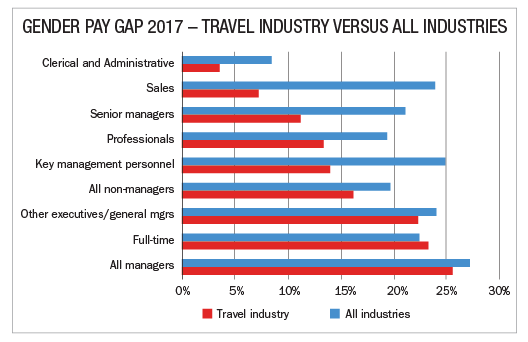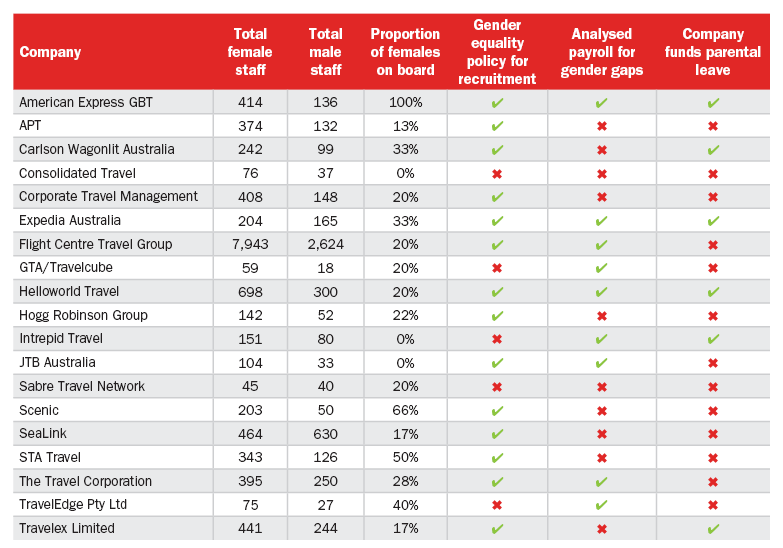Women get paid less than men, and we must do something about it! That’s the emotive catchcry being heard with increasing volume in the Australian travel industry — but is it accurate? And if it is true, why is it so and what is the answer? Bruce Piper tackles the touchy issue to untangle the facts of the matter from the fiction.
International Women’s Day in March this year became a focus for a range of travel industry events looking at issues of equality and fairness — in particular around the so-called “gender pay gap”. Polls such as the annual travelBulletin Travel Industry Salary Survey have repeatedly highlighted the fact that, as in many industries, women in travel are paid less on average than their male counterparts. On the face of it this looks deeply unfair — and more than that, it doesn’t seem to make sense. How can it be that in the travel sector, which is so heavily dominated by a female workforce at all levels, such discrimination continues to exist in this day and age?
Amid all of the emotion it is easy to be confused about what the actual issues are.
There is no question that in Australia pay rates should be equal for men and women — in fact it is illegal to discriminate between staff on the basis of gender, age, race, sexual orientation, political opinion, disability, pregnancy or marital status. There are strong provisions to enforce this and a host of government bodies and other organisations poised to battle unfairness in the workplace. So let’s look a little deeper to see if we can understand the basis of all the angst.
It’s not just about pay
The Australian Workplace Gender Equality Agency (WGEA) is a government organisation formed to address this very issue, and provides some good insights into what is behind the phenomenon. Workplace gender equality is not just about pay — it’s about ensuring that people are able to access and enjoy the same rewards, resources and opportunities regardless of gender. The fact that the pay gap exists does have long term implications for women — in particular it means that they are able to accumulate less retirement or superannuation savings. But there’s more to the issue than that.
The agency says the aim of gender equality is to achieve “broadly equal outcomes” for men and women, but notes that doesn’t imply identical outcomes. What is right for one person is not necessarily the solution for another — but the key is to provide the same opportunities regardless of gender. The WGEA says to achieve equality in outcomes requires four key actions:
- Workplaces to provide equal pay for work of equal or comparable value;
- Removal of barriers to the full and equal participation of women in the workforce;
- Access to all occupations and industries, including leadership roles, regardless of gender; and
- Elimination of discrimination on the basis of gender, particularly in relation to family and caring responsibilities.
Interestingly, the agency also notes that while achieving gender equality is important because it is the “right thing to do” it is also good because it is linked to the country’s overall economic performance. Gender equality has been linked to improved productivity, better company results and an enhanced ability for businesses to attract talent and retain employees.
Does the pay gap exist?
No Australian employer is legally allowed to pay females less than males. Yet the evidence is clear — women do earn less on average in the Australian travel industry than men. Last year’s travelBulletin industry salary survey found that the average income of respondents was $66,603. However women, who made up 73% of those surveyed, averaged $62,003 each annually, compared to almost $80,000 for men. That was a repeat of the pattern from the travelBulletin salary survey the previous year, where women averaged $50,494, versus men who earned $67,074.
Our survey results are mirrored by official figures gathered by the Workplace Gender Equality Agency. Legislation mandates that all non-public sector employers with 100 or more staff must lodge an annual report with the WGEA, summarising their performance on a number of “gender equality indicators” such as workforce and board composition, equality of remuneration between women and men, policies around flexibility and support for employees with family responsibilities, consultation with staff on gender equality and sex-based discrimination.
For 2017 there were 16 organisations which submitted figures which are collated under the “Travel Agency and Tour Arrangement Services” division of the WGEA report — covering a total of 16,247 employees. 70.8% of staff in the industry are female, and there was a 23.3% “total remuneration gender pay gap” for full-time industry employees. But interestingly across most sectors of the industry, for senior staff the pay gap in the travel industry was significantly lower than other industries. For example, for key management personnel, the pay gap across all industries was 24.9%, versus 14% for the travel industry. Similarly female senior managers in the travel industry earned 11.2% less than their male counterparts — compared to a 21.1% pay gap across all industries. As the graph below indicates, the travel industry gender pay gap is significantly smaller than the rest of the economy.

While the WGEA doesn’t make public the details of the actual gap between different companies, it is possible to access the individual performance of large travel industry organisations which is tabulated in the scorecard below. On this basis the best performers in the industry on a gender equity basis are Helloworld Travel, American Express Global Business Travel and Expedia Australia which have all analysed their payroll for gender gaps, have a gender equality policy for recruitment and offer full company-funded parental leave for staff.

In a perfect world…
Economists have done lots of analysis of the gender gap in the workplace, with one of the most interesting studies recently involving millions of records courtesy of ride-sharing giant Uber. The disruptive innovator is part of the so-called “gig economy” which allows its workers to have complete flexibility in setting their hours. Uber’s fares are set by a completely gender-blind algorithm. When a driver is selected to pick you up the system doesn’t know whether they are male or female, and the pay structure is completely transparent, based on the length and distance of the ride and potentially a “surge multiplier” at times of peak demand.
When presented with this scenario, researchers expected the transparency and simplicity of the Uber model would intrinsically eliminate the gender pay gap. But amazingly the scientists from the University of Chicago found that male Uber drivers make about 7% more per hour than females. How could this be? Further analysis aimed to determine why the women earned less, and after correlating a host of possible factors, they found there were three key influences.
The first was based on the time and location of trips. Male drivers were slightly more likely to choose neighbourhoods and destinations that generated more income — such as trips to the airport during peak periods, which were found to be completed by more men than women Uber drivers. Men were more likely to drive the overnight shift — but conversely in the USA female Uber drivers were more often working on a Sunday afternoon during the football season, which was also a high-yielding period.
The second driver of the difference was experience. The more trips an Uber driver had done, the higher their income because they were better at making money on the platform. Men were much more likely to have been driving for Uber for more than two years, while the attrition rate of female drivers was higher as many ceased driving on the platform after about six months on average. Finally, there was a slight difference in driving style — in that the male Uber drivers were likely to drive about 2% faster than females. Together these three factors accounted for the 7% gender pay gap. The researchers noted that after stripping away all the other determinants, the Uber data revealed that just as in other industries, men and women are making different choices in the labour market so there are perfectly reasonable explanations for the pay gap.
Wrapping it up
During the 2018 International Women’s Day event in Sydney hosted by JITO Connected, the more than 500 female and male attendees were united in their pursuit of equality. There is no doubt the groundswell is completely in support of eliminating the gender gap — not just in pay but in advancement and seniority. The bottom line is that the Australian travel industry is a leader in gender equity when compared to the rest of the economy. The incredible flexibility the industry offers — including the huge array of home-based opportunities which allow workers to create an optimal work-life balance — makes it highly appealing to people who are caring for other family members, so no wonder there are so many women in travel.
As one of the speakers at the event noted, one of the best ways for males in the industry to help achieve equality is for them to say no — no to working on weekends, no to late night events, no to trips that take them away from their families. If men push back because of their responsibilities outside of the workplace, ultimately that will help to level the playing field for everyone in the industry.
The Uber data shows that even under a perfect gender-blind economic model the pay gap still exists. If female Uber drivers adopted the patterns of their male counterparts — worked longer hours, stayed on the platform for longer to gain more experience and drove just a little bit faster — the research confirms that they would earn the same hourly rate as the men. But the reality is that they don’t, because men and women make different choices as drivers.
The same is true of the wider economy, and in particular the travel industry. Different choices made by women and men clearly do result in a gender pay gap, but the data indicates that in fact travel is significantly ahead of other sectors when it comes to a level playing field of opportunity.
By all means let’s continue to push for change. Let’s support women (and men) as they combine jobs with family responsibilities, and let’s make sure we remove barriers to equality in pay and opportunity.
But at the same time it’s important to recognise that in the end, having the freedom to choose how you balance your own work and life is the greatest equality of all.


